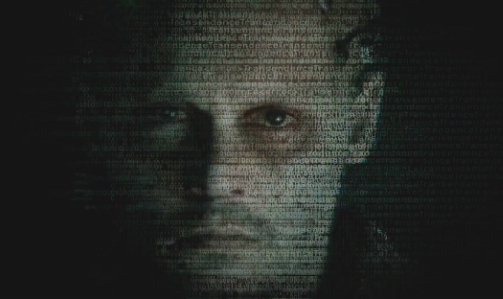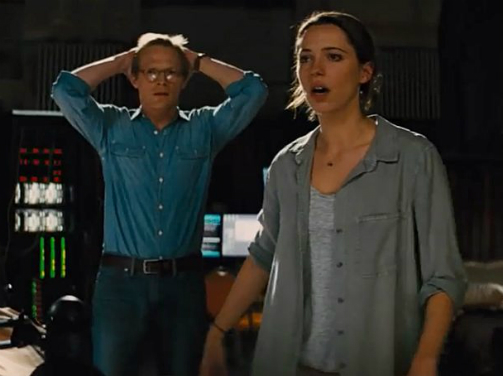Fanboy Flick Pick: Transcendence Is a Sci-Fi of Ideas…Just
 |
Considering the way Transcendence has avoided giving out too many excessive plot details in its trailers, it’s a bit stunning just how immediately the movie itself spoils its own ending. Even I , who normally insist that the first half of a film is fair game for description, would feel a little weird about describing the opening scene, so suffice it to say that it shows the aftermath of something major, in a manner that makes it pretty clear how things had to have been resolved. The entire rest of the movie takes place 3-5 years earlier, and by basically removing the narrative tension of how it ends, director Wally Pfister (Christopher Nolan’s cinematographer, making his feature directorial debut) has made it so that the only thing left is to debate the ideas. Which is actually a pretty classical science fiction thing to do, but it may not sit well with every member of the modern audience.
That the movie actually has ideas is a welcome break from so many others. They may not be as elegantly phrased as someone like Rod Serling would have it, but I think he’d appreciate the heart of this story nonetheless.
Johnny Depp and Rebecca Hall play, respectively, Will and Evelyn Caster, a married couple who are both brilliant scientists working on artificial intelligence. Best friend Max (Paul Bettany) is in the same field, but more interest in the side benefits of mapping the brain, like curing diseases. Depp’s idea of playing “brilliant,” you may not be surprised to know, involves adding a whole bunch of needless tics and fidgets…and that’s even before he gets cancer from a polonium bullet, which adds even more.
 |
But no, it isn’t Vladimir Putin who’s out to get him. Rather, it’s a terrorist group called Drift, who in typical movie-world “nonpartisan” style (notice I didn’t say “apolitical”) can be read as either radical hippies who hate technology, or radical creationists who hate that man might create a false god in a sentient computer. We never get into their thought processes too much, so let’s just call them the negative Nellies. Much like really stupid versions of the protagonists in Greek tragedies, they end up bringing about the very thing they wish to avoid, as Will’s radiation poisoning prompts Evelyn to get really risky and map his brain into the computer, creating an AI version of Will before he dies. Or is it? Could this just be the previous AI program, codenamed Pinn, putting on a happy Depp face as it plans to go Skynet on everyone? Or indeed, a reborn Will using his newfound Jesus-like powers for good? (Via nanoprobes, he can heal the sick, make it rain and soforth.)
Now, if you ask me, a real human brain mapped into a computer would be more like Max Headroom, using his newfound power to play music videos, yammer on about golf, and probably watch every porn flick on the Internet at once. Oh wait, I’m thinking of myself. Except the golf part.
 |
The story sustains an interesting dramatic conundrum throughout – we know, based on that opening scene, where things are going, and yet we root against the people who are most correct in assessing the situation. This could be deliberate ambiguity, or it could be just that the big movie stars are inherently more likable. Pfister wants us to have a conversation about technological pros and cons, and attempts to make it topical with half-hearted allusions to the NSA and polonium poisoning. In the end, though, it comes down to the standard trope of what life is and where the soul resides, with computer Depp a potential reverse-Pinocchio – a good boy deprived of real life and become an aggressive puppet who squashes his conscience. When it came time for his wife to make the crucial decision as regards their future together. I genuinely did wonder what way she’d go. That the idea isn’t new – rather, a rite of passage for HAL-9000, Data and every droid since – may be a demerit, but at least there is an idea.
Aside from Depp’s overly twitchy performance, acting is fine throughout, especially from Hall, who must both love and fear her new Electric Dream, and decide which emotion wins out. Morgan Freeman shows up and ably punches the clock as a character with no reason to exist (hell, he doesn’t even narrate – Bettany does), and Cillian Murphy is here as Fed just because. Also Cole Hauser shows up for 5 minutes and still gets prominent billing in the credits, but he makes the most of those minutes like there were overage fees.
Perhaps the right 30-minute Twilight Zone episode could convey the story in tighter fashion, but compared to the movies I’ve seen lately that had no thoughts in their heads, I’ll give a thumbs-ceilingward to this one that has at least two. And remember what the movies teach you, kids: any time science creates something that seems too good to be true, the unexpected side effect will get people killed. So the moral is you should never trust science.
